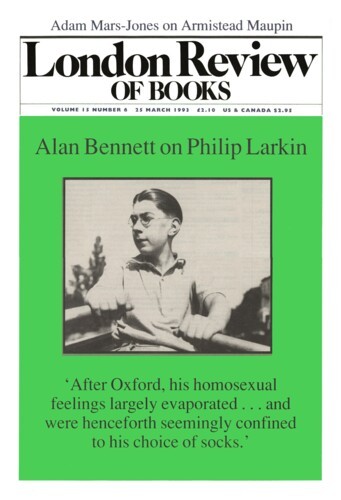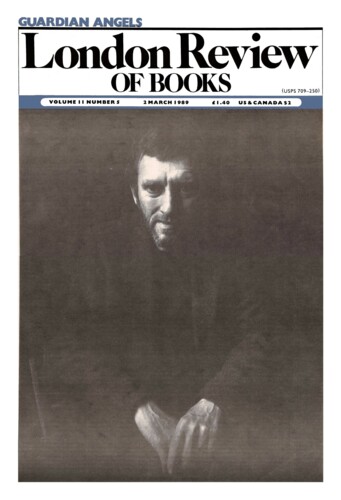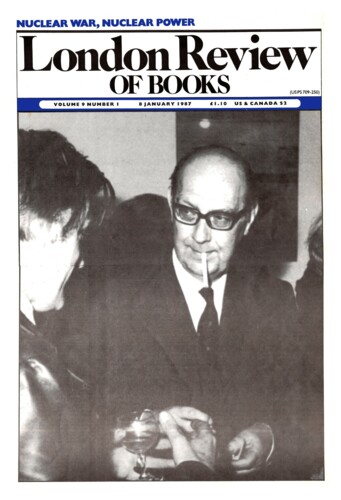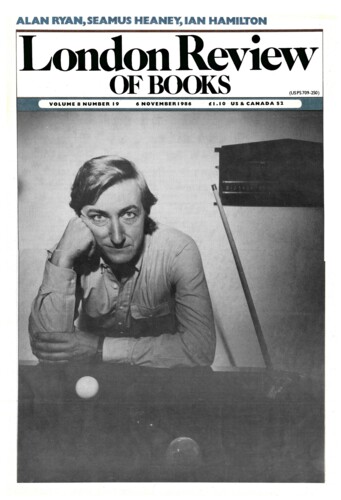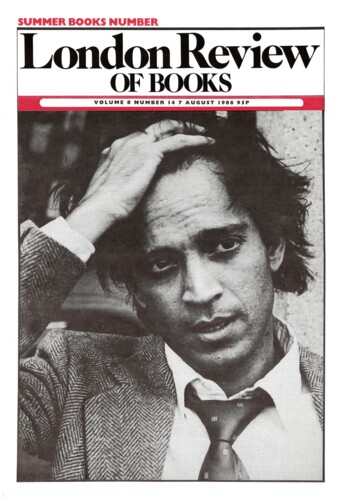Pat Rogers
Pat Rogers, a professor of English at the University of Bristol, is the author of a study of Robinson Crusoe and of Hacks and Dunces: Pope, Swift and Grub Street.
Defoe or the Devil
Pat Rogers, 2 March 1989
Comically observant, admonitory, but not quite reproachful, very English in its good-humoured and long-suffering manner, The Canonisation of Daniel Defoe is in more ways than one a caution. The cautionary tale it tells concerns the unplanned growth of the canon of Defoe’s works, which has sprawled from a hundred items to something like six times that figure in the last two centuries. P.N. Furbank and W.R. Owens take us through the stages of this galloping hypertrophy more in sorrow than in anger, but they leave no doubt that the guilty men who have swollen the corpus with their rash attributions have been abetted by the passivity of other Defoe scholars. They argue that our sense of Defoe has been distorted by this process of aggrandisement, which has been going on virtually unchecked, and at an accelerating pace, in the 20th century. What they would like to see is a ‘root and branch’ exercise to clear away false accretions on the body of Defoe’s authenticated writing. So far so good: and no reader of their book can possibly demur at large parts of their thesis.
Oddity’s Rainbow
Pat Rogers, 8 January 1987
John Wesley had a few words for Sterne: ‘For oddity, uncouthness, and unlikeness to all the world beside, I suppose the writer is without a rival.’ Well, something odd will do for ever if the sensation-seekers have their way; Tristram Shandy has outlasted Johnson’s Dictionary, even in the classroom. Sterne was the first author to come up with fully explicatable – as distinct from explicable – texts, in English fiction anyway. His books are as necessary to the formalists as to the historians of feeling, and it is his apparent formlessness which guarantees him this place. Quite often he is rejected by students on first acquaintance, partly through a priggishness which will allow only the young to talk dirty. But he comes into his own in the graduate school and the Zapp-it-to-me international seminars, where priggishness takes more unnatural and exclusive forms.’
Heroes
Pat Rogers, 6 November 1986
Sated with hermeneutics, weary of metacriticism? No head for the heights of abstraction – vertigo hits you as soon as you set foot on the gossamer constructions of current art theory? You get ringing in your ears when you read Norman Bryson, and fear you have caught Ménière’s disease off the page? Do not despair. There is a remedy. The second posthumous volume of Edgar Wind’s essays outdoes even its sumptuous predecessor in intellectual glitter and academic burnishing. Only 120 large pages of text, but they come with 124 plates; in the ratio of historical weight to linear extent they must constitute the densest object in the universe of books. If a more searching scholarly examination of mainstream European ideas has been published in this country during the 1980s, then I have missed it.’
Puellilia
Pat Rogers, 7 August 1986
We shouldn’t need Dale Spender to remind us that the language of literary history is man-made, and the order it imposes on the past a male construct. We shouldn’t, but we probably do, and the truth remains salutary, even though Spender’s book is about as flawed in execution as it is possible to get without the pages flying apart as you read. Mothers of the Novel has a perfectly defensible, indeed defence-worthy, thesis. A very good case could be made in favour of Spender’s assertion: ‘If the laws of literary criticism were to be made explicit they would require as their first entry that the sex of the author is the single most important factor in any test of greatness and in any preservation for posterity.’ Spender fails to make this case mainly because her own criteria of greatness are so muddled and her notion of historical causation is so wobbly. But imperfect advocacy of an important argument is one of the factors which have enabled men to go on silencing female utterance, so even a book as crude, inaccurate and derivative as this one should not be allowed to prejudice the case.
Pieces about Pat Rogers in the LRB
Puppeteer Poet: Pope’s Luck
Colin Burrow, 21 April 2022
Alexander Pope wrote in an age of Party – in the political rather than Downing Street sense – and his kind of intelligence was exactly attuned to an environment in which different groups of people...
Rogering in Merryland: the Unspeakable Edmund Curll
Thomas Keymer, 13 December 2007
Samuel Johnson would not have had the term ‘Curlism’ in mind when he expressed regret that, even as his dictionary was being printed, ‘some words are budding, and some falling...
Strutting
Linda Colley, 21 September 1995
There is a sinister painting by the 18th-century artist Francis Hayman of a couple frolicking on a seesaw. A youth soars triumphantly into the air, but his hold seems precarious. His female...
Every one values Mr Pope
James Winn, 16 December 1993
Alexander Pope’s talent for inspiring enmity is central to his reputation. His contemporary enemies were impressive in quantity and intensity: J.V. Guerinot’s bibliography of Pamphlet...
Beast and Frog
John Bayley, 4 November 1993
Death is something that happens to other people: and hence, it might be inferred, the popularity of biography. Those whose lives are recorded die in the last chapter: the rest of us live for...
Denis Donoghue writes about the Age of Rawson, and Rogers
Denis Donoghue, 6 February 1986
Now that the main ideas at large in the 18th century have been elaborately described, students of the period have been resorting to more oblique procedures. In 1968, in The Counterfeiters, Hugh...
Read anywhere with the London Review of Books app, available now from the App Store for Apple devices, Google Play for Android devices and Amazon for your Kindle Fire.
Sign up to our newsletter
For highlights from the latest issue, our archive and the blog, as well as news, events and exclusive promotions.
